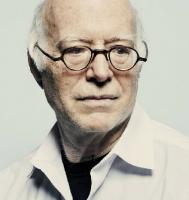Amos Tversky: biography of this cognitive psychologist
Amos Tversky (1937-1996) was a cognitive psychologist, with significant training in mathematics, who contributed much of the fundamental knowledge in cognitive science. Among other things, he studied cognitive biases and risk management, questions that were applied in an important way in other disciplines, such as economics or law.
In this article we will see a biography of Amos Tversky, as well as some of his contributions to the development of cognitive psychology.
- Related article: "History of Psychology: main authors and theories"
Biography of Amos Tversky: pioneer in cognitive psychology
Amos Tversky was born on March 16, 1937 in Haifa, Israel. He is the son of the veterinarian Yosef Tversky, and of Genia, a woman member of the Israeli parliament for almost twenty years. Both Yosef and Genia had migrated to Israel from Poland and Russia. In the 1960s he formed a couple with one of the most representative cognitive psychologies of our time, Bárbara Tversky, with whom he also had two sons and a daughter.
From a young age, Tversky served in the Israeli army forces, initially as part of the elite paratrooper unit, and later as a serving captain during three wars.
In 1961, Amos Tversky obtained his undergraduate studies from the University of Hebrew, and later, in 1965, he obtained a doctorate from the University of Michigan. At the same university, as well as at Tel Aviv, he served as a professor and researcher in psychology and economics, and later He did different jobs at Stanford University's Center for Advanced Studies in Behavioral Sciences, where he served from the late 70's until his death.
Among his main contributions is to have laid the foundations for the understanding of psychological phenomena that occur in the commercial context. For example, the decisions and reactions of consumers to some market strategies such as offers, discounts or the use of credit cards. For the same, his contributions were relevant not only for cognitive psychology but for economics.
Main theoretical contributions
For a long time, Amos Tversky worked hand in hand with another Israeli psychologist and later Nobel laureate in economics, Daniel kahneman. Over the course of the 1970s and early 1980s, they developed theories about judgment in situations of uncertainty; decision making under risk situations, and rational choice.
According to Tversky, when people make decisions, we stay active in exercising to understand and rationally justify what we have chosen (theory of choice based on reason). In turn, elections are built on the same complex problem solving process.
This means that the justification of a choice, and the preference for it, do not occur before the problem-solving process, but are generated while the process itself occurs, especially faced with the need to make trade-offs between values and goals for each decision.
Cognitive biases
Together with Kahneman, Tversky explained how "cognitive illusions" or biases of human judgment occur. The latter has an important impact on later studies on reasoning, both in psychology, as well as in economics, business, philosophy and medicine.
From different studies, both psychologists suggest that people tend to make decisions without taking into account probabilities, that is, through intuitive rules that often lead to cognitive biases systematic.
For example, the belief that the higher the price, the better the quality of a product. In fact, as part of his studies, Tversky observed that indeed people reported a higher liking for the product when their brand was priced high; Compared to another product whose price was low. They called this bias the “perception bias between price and quality”.
On the other hand, Tversky carried out important work on decision-making under conditions of uncertainty, and observed that with Often, the limited understanding of the laws of chance is erroneously transferred to the understanding of other processes marked by the uncertainty.
From there, Tversky together with Kahneman, developed the Theory of perspective, which had a very important pact in financial economics, as it addresses decision-making in relation to variables such as time, uncertainty and alternatives.
- You may be interested: "Cognitive biases: discovering an interesting psychological effect"
Awards and distinctions
For his contributions to cognitive psychology, Amos Tversky was awarded various awards and recognitions. For example, in 1980 he was elected to the prestigious American Academy of Arts and Sciences, and later, in 1985, he was an associate researcher at the National Academy of Sciences.
On the other hand, he won the APA Award for Distinguished Scientific Contribution in 1982, and was recognized as honorary doctorate from the universities of Chicago, Tale, Gothenburg and the State University of New York in Buffalo.

